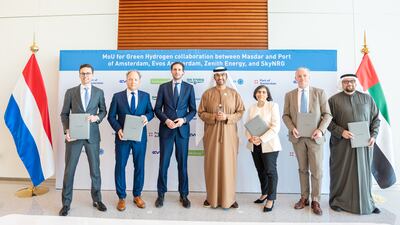Abu Dhabi clean energy company Masdar has signed a preliminary agreement with four Dutch companies to explore the development of a green hydrogen supply chain between Abu Dhabi and Amsterdam.
The agreement, signed with the Port of Amsterdam, SkyNRG, Evos Amsterdam and Zenith Energy, will focus on green hydrogen production in Abu Dhabi and export to the Netherlands through the port of Amsterdam, Masdar said in a statement on Friday.
“This agreement builds upon the existing relationship between the UAE and the Netherlands and demonstrates our mutual commitment to exploring low- and zero-carbon energy solutions,” said Dr Sultan Al Jaber, UAE Minister of Industry and Advanced Technology, Cop28 President-designate, managing director and group chief executive of Adnoc and chairman of Masdar.
“The UAE aims to play a central role in the emerging green hydrogen economy and this partnership with the Port of Amsterdam and associated players in the green hydrogen space would help position Abu Dhabi as a key hub for green hydrogen development.”
Hydrogen is set to play a key role in the transition to a net-zero energy system and help in decarbonising sectors that are difficult to electrify — such as heavy industry and long-haul transport, according to the International Renewable Energy Agency.
Globally, the hydrogen industry is expected to be worth $183 billion this year, up from $129 billion in 2017, according to Fitch Solutions.
French investment bank Natixis estimates that investment in hydrogen will exceed $300 billion by 2030.
The demand for green hydrogen, specifically, which is produced with electricity from renewables like wind or solar, is booming.
Last month, Masdar announced its new shareholding structure as part of a deal with Abu Dhabi National Energy Company — better known as Taqa — Mubadala Investment Company and Adnoc, along with the creation of a green hydrogen business unit.
It now has a goal of achieving 100 gigawatts of renewable energy capacity and green hydrogen production of 1 million tonnes a year annually by 2030.
As part of Masdar's latest agreement, green hydrogen exported from Abu Dhabi will be delivered to key European sectors, such as sustainable aviation fuel, steelmaking, and bunkering for shipping, the statement said.
It will also be supplied to new, emerging European offtakers — entities that commit to purchase power generated by energy producers for specific time period at a fixed price — through pipeline, lorry and barge.
Together, the parties will explore several hydrogen transportation methods, with a focus on liquid organic hydrogen carriers and liquid hydrogen.
“The Netherlands is keen on developing green hydrogen corridors with major future exporting countries like the UAE,” said Netherlands Foreign Minister Wopke Hoekstra.
“Our country is well positioned to become a hydrogen hub for the north-western European market.”
Port of Amsterdam, the operator of Europe’s fourth-largest port, is working with commercial parties there on green hydrogen development.
Zenith Energy and Evos Amsterdam operate blending and storage terminals in the port.
SkyNRG is developing a network of SAF production facilities that require green hydrogen as input.
“Masdar believes green hydrogen to be a promising energy source for hard-to-abate sectors in support of global decarbonisation, which is why we launched our dedicated green hydrogen business last month,” Mohamed Al Ramahi, chief executive of Masdar, said.
“We are pleased to partner with Port of Amsterdam, SkyNRG, Evos Amsterdam, and Zenith Energy to leverage our synergies in the fuel and logistics sectors to see how green hydrogen can help us achieve our shared goals for decarbonisation and sustainable economic growth.”
Masdar is already involved in a number of projects related to green hydrogen production.
Last year, it signed agreements with Egyptian state-backed organisations to co-operate on the development of green hydrogen production plants in the country.
In the first phase, the companies aim to establish a green hydrogen manufacturing unit that is capable of producing 100,000 tonnes of e-methanol annually for bunkering in the Suez Canal, Masdar said at the time.
The unit is expected to be operational by 2026.
Electrolyser facilities in the Suez Canal and on the Mediterranean could also be extended to up to 4 gigawatts by 2030 to produce 2.3 million tonnes of green ammonia for export and output of up to 480,000 tonnes of green hydrogen a year.


